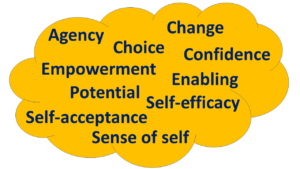
I’ve probably mentioned before that people often start Alexander Technique lessons for help with one particular problem – common examples are back pain, stress or posture. In the process of taking lessons, however, they usually discover other diverse, and often surprising benefits.
One of these wide-ranging benefits is developing a greater sense of agency. Agency can be defined as the sense of control that you feel in your life. This includes your capacity to influence your own thoughts and behaviour, and your belief in your ability to manage a wide range of different situations and tasks, as well as to direct your own future.
For me that is a pretty good description of what the Alexander Technique can offer us. It might sound a bit grandiose or theoretical, so let me give you some practical examples which range from ‘small everyday things’ to one-off life-changing decisions.
Just this week, one of my clients reported that she found herself choosing not to immediately call back when she noticed she’d missed a phone call from someone who wanted her advice. This lack of ‘jumping to it’ ran against her habit of a lifetime. Rather than the usual immediate reaction – which would have led to her giving a rather hurried response, as well as leaving her with a feeling of resentment over the interruption to her day off – she instead waited till the next day before calling back. It turned out that, by not sacrificing her own needs, she was actually able to give more help to the person, as the advice she offered was more considered, comprehensive and very kindly delivered. Other clients tell me how they no longer feel so rushed or pressured by others over everyday things, or how they have developed more patience and tolerance. Such examples might seem of fairly minor significance. However, imagine the cumulative effect of such a shift of attitude and behaviour this might have on life over the long term.
At the other end of the spectrum, people find that having Alexander lessons enables them to ‘take a step back and take stock of their life’, occasionally leading to big personal decisions such as changing their job, or deciding to get a divorce.
Ask any Alexander teacher and they will have a host of similar examples to tell you. But it’s not just anecdotal evidence. There is now a range of research, led by myself [1, 2] and by my colleagues [3, 4], that demonstrates how taking Alexander lessons with STAT-registered teachers, can lead to greater self-efficacy, sense of control, confidence, and sense of self – in other words, to developing more agency.
If we’re stuck in habitual patterns of reactivity to life, it’s hard to take time to decide what we really want for ourselves. Through the Alexander Technique we learn how to ‘give ourselves space and time’ for greater choice and self-determination.
References
- Julia Woodman, Kathleen Ballard, Catherine Hewitt, Hugh MacPherson. Self-efficacy and self-care-related outcomes following Alexander Technique lessons for people with chronic neck pain in the ATLAS randomised, controlled trial. European Journal of Integrative Medicine 2018; doi: 10.1016/j.eujim.2017.11.006
- Aniela Wenham, Karl Atkin, Julia Woodman, Kathleen Ballard and Hugh MacPherson. Self-efficacy and embodiment associated with Alexander Technique lessons or with acupuncture sessions: A longitudinal qualitative sub-study within the ATLAS trial. Complementary Therapies in Clinical Practice 2018;31:308–14
- Kinsey D, Glover L, Wadephul F. How does the Alexander Technique lead to psychological and non-physical outcomes? A realist review. European Journal of Integrative Medicine 2021; 46: https://doi.org/10.1016/j.eujim.2021.101371
- Charlotte Woods, Emma Wolverson and Lesley Glover. Extending understanding of ‘care’ as an embodied phenomenon: Alexander Technique teacher perspectives on restoring carers to themselves. International Journal of Care and Caring 2022, DOI: 10.1332/239788221X16643644394404